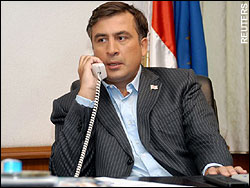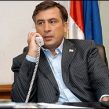
MOSCOW MORE WORRIED ABOUT SAAKASHVILI THAN KIM JONG-IL
Publication: Eurasia Daily Monitor Volume: 3 Issue: 192
By:

Among all of North Korea’s neighbors, Russia seems to be the least concerned with the recent nuclear test conducted by the reclusive regime of Kim Jong-Il. Of course, the Russian Foreign Ministry made an official protest and demanded that Pyongyang must “immediately return to the non-proliferation regime” (RIA-Novosti, October 9). President Vladimir Putin also voiced his disapproval. However, Kremlin-connected commentators put equal blame on the United States for the current nuclear crisis (strana.ru, October 16).
Washington has once again been accused of using double standards. There is currently no evidence of North Korea proliferating nuclear material or technologies, while it has been proven that Pakistani nuclear scientist Abdul Qadeer Khan created an international nuclear black market that provided Iran and Libya with centrifuges to enrich uranium with materials and know-how to make uranium-based nuclear devices. Khan, apparently, also helped North Korea to develop a uranium program for the military. Still Pakistan is not under sanctions, while North Korea is punished (strana.ru, October 16).
Russia in the end voted for the imposition of UN sanctions on North Korea. However, many in Moscow saw this as a primitive trade off: The United States agreed to support a Russian-sponsored UN Security Council resolution scolding Georgia for “provocations” in breakaway Abkhazia in exchange for a Russian “yes” vote on North Korea. The Kremlin-connected director of the Institute for Political Research, Sergei Markov, told Interfax news agency on October 13, “It is logical to swap a resolution on Georgia for a resolution on Korea.” The chief editor of Moscow News, Vitaly Tretyakov, told Radio Mayak on October 16, that this diplomatic exchange of resolutions “reflects the striking growth of Russia’s international standing.”
Of course, the UN resolution on Georgia does not contain any sanctions or threat of sanctions. Its main purpose was to extend the mandate of UN observers in Abkhazia (see EDM, October 18). But the UN resolution on North Korea imposes serious sanctions. The presumed “exchange” of resolutions is clearly unequal. The enthusiasm with which the pro-Kremlin Moscow elite has hailed the “exchange” as a major foreign policy successes underlines a peculiar fact: In Russia the conflict with Georgia is seen as an equal, if not a more important event, than the Korean nuclear crisis and Georgian President Mikheil Saakashvili as dangerous as Kim Jong-Il.
Putin and other Russian leaders have repeatedly stressed strict adherence to non-proliferation. At the same time, Russia cooperated with North Korea in the past and helped it to begin its nuclear program. Moscow is also cooperating with Iran on the building of the Bushehr nuclear power plant; Iranian students are trained in Russia in nuclear physics and in reactor science.
In 1965, the USSR provided North Korea with a 2-megawatt IRT-2000 research reactor and trained North Korean nuclear specialists, kick-starting Pyongyang’s nuclear program. A research paper published in Russia in June 2003 (and included intelligence-connected sources according to the paper’s authors) calculated that some 250 North Korean students and post-graduate researchers had studied nuclear science in the USSR and Russia. The North Koreans used the training to increase the capacity of the IRT-2000 reactor fourfold, to build a uranium reactor fuel enrichment facility, and in 1986 managed to put into operation their own 25-megawatt reactor, capable of producing arms-grade plutonium. The paper concluded that by 2003 North Korea had acquired all necessary knowledge to maintain a nuclear program and to produce nukes (www.carnegie.ru, 2003).
Unlike Iran, which has up to now discovered only minuscule natural uranium deposits on its territory, North Korea has lots of the stuff. In 1993 the Russian foreign intelligence service published an estimate that North Korean deposits held up to 15,000 tons of extractable natural uranium and had two mines producing uranium. This amount is sufficient to produce nukes as well as to begin a self-sufficient civilian nuclear power program (Foreign Intelligence Service of the Russian Federation, Moscow, 1993).
Special nuclear arms labs are closed to any foreigners, Korean or otherwise. At the same time the Russian authorities have more or less turned a blind eye while Korean students gained general nuclear and reactor know-how that allowed them to eventually produce a nuclear weapon.
Russian military chiefs have never seriously considered North Korea a threat, even if it obtains a minimal nuclear capability. After the Koreans exploded their device, Russian Defense Minister Sergei Ivanov stressed that the test did not cause any ecological damage in Russia and that the problem must be resolved by purely diplomatic means (Interfax, October 9).
Arms trade with Pyongyang is minute: some spare parts for weapons procured before the demise of the Soviet Union and from time to time a batch of old helicopters, discharged by the Russian military or some other rusty secondhand stuff. Of course, Moscow would readily sell Pyongyang new weapons, as it does Tehran, but the North Koreans do not have the money Iran has. The UN sanctions against North Korea will not seriously disrupt any important Russian arms or nuclear contracts.
Kim Jong-Il and his regime are not liked in Moscow. Likewise, the Kremlin does not appreciate U.S. world domination. Russia’s Korean policy is somehow balanced between these two dislikes. In practice this means that after the Korean nuclear test on October 9, Moscow coordinated its position with the Chinese and followed Beijing’s lead. Russia positively does not want nuclear proliferation to get out of hand, but it does not want regime change in Pyongyang either.




